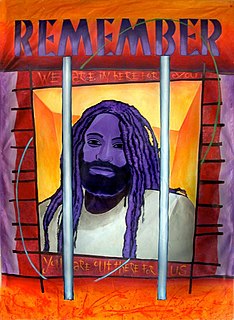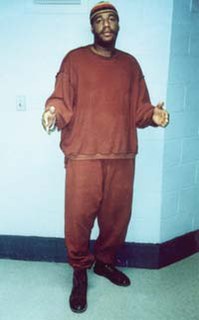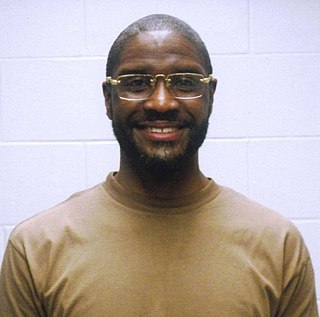Related Research Articles

Mumia Abu-Jamal is an American political activist and journalist who was convicted of murder and sentenced to death in 1982 for the 1981 murder of Philadelphia police officer Daniel Faulkner. He became widely known while on death row for his writings and commentary on the criminal justice system in the United States. After numerous appeals, his death penalty sentence was overturned by a Federal court. In 2011, the prosecution agreed to a sentence of life imprisonment without parole. He entered the general prison population early the following year.

Capital punishment, also called the death penalty, is either abolished, suspended, or an active/inactive legal penalty in parts of the United States, with it being a legal punishment in 27 states, American Samoa, the federal government, and the military. Although it is a legal penalty in 27 states, only 21 states have the ability to execute death sentences, with the other 6, as well as the federal government, being subject to different types of moratoriums. The existence of capital punishment in the United States can be traced to early colonial Virginia. Along with Japan, Taiwan, and Singapore, the United States is one of four advanced democracies and the only Western nation that applies the death penalty regularly. It is one of 54 countries worldwide applying it, and was the first to develop lethal injection as a method of execution, which has since been adopted by five other countries. The Philippines has since abolished executions, and Guatemala has done so for civil offences, leaving the United States as one of four countries to still use this method. It is common practice for the condemned to be administered sedatives prior to execution, regardless of the method used.

Samuel Anthony Alito Jr. is an associate justice of the Supreme Court of the United States. He was nominated by President George W. Bush on October 31, 2005, and has served since January 31, 2006. He is the second Italian-American justice to serve on the Supreme Court, after Antonin Scalia, and the eleventh Roman Catholic.

Christopher Douglass Roney, known by the stage name Cool C, is an American former rapper who was active in the late 1980s. He is also known for his involvement in the murder of Philadelphia Police officer Lauretha Vaird, during a bank robbery in January 1996, for which he was sentenced to death. He is currently on death row.
A stay of execution is a court order to temporarily suspend the execution of a court judgment or other court order. The word "execution" does not necessarily mean the death penalty ; it refers to the imposition of whatever judgment is being stayed. It is similar to an injunction.
Capital punishment is a legal penalty in Singapore. Each execution in Singapore is usually carried out by long drop hanging in Changi Prison at dawn on a Friday, except once on 20 May 2016 when the execution of Kho Jabing was carried out at 3:30 pm after his appeal for a stay of execution was dismissed that same morning. In a survey done in 2005 by the Straits Times, 95% of respondents believe that Singapore should retain the death penalty. Most recently, in 2020, the support for capital punishment in Singapore has tallied to around 80%.
The 1982 Wilkes-Barre shootings was a spree killing in the United States carried out by George Emil Banks. A former Camp Hill prison guard, Banks shot 13 people to death on September 25, 1982 in Wilkes-Barre, Pennsylvania and Jenkins Township, including seven children – five being his own – their mothers, some of their relatives, and one bystander.
Michael Anthony Taylor was a Missouri prison inmate on death row, convicted of raping and murdering 15-year-old Ann Harrison after abducting her from a school bus stop in Raytown, Missouri on March 22, 1989. Taylor was aided by Roderick Nunley who was executed on September 1, 2015 after three Supreme Court issued orders denying a stay of execution for Nunley, who was 50 years old. The appeals pending before the Court questioned the constitutionality of the death penalty, the sentencing of Nunley before a jury rather than a judge, and the secrecy of the state of Missouri in acquiring the drug used to perform the execution.

Paul Dennis Reid, Jr., also known as "The Fast Food Killer", was an American serial killer, convicted and sentenced to death for seven murders during three fast-food restaurant robberies in Metropolitan Nashville, Tennessee and Clarksville, Tennessee between the months of February and April 1997. At the time of the murders, Reid lived with roommate Brian Fozzard and had a room at a boarding house, and he was on parole from a 1983 conviction in Texas on charges relating to the aggravated armed robbery of a Houston steakhouse. He had served seven years of a 20-year sentence, and was paroled in 1990. Originally from Richland Hills, Texas, a suburb of Fort Worth, Reid went to Nashville to pursue a career as a country music singer.

Commonwealth of Pennsylvania v. Mumia Abu-Jamal was a 1982 murder trial in which Mumia Abu-Jamal was tried for the first-degree murder of police officer Daniel Faulkner. A jury convicted Abu-Jamal on all counts and sentenced him to death.
Kennedy v. Louisiana, 554 U.S. 407 (2008), is a landmark decision by the Supreme Court of the United States that held that the Eighth Amendment's Cruel and Unusual Punishments Clause prohibits imposing the death penalty for the rape of a child in cases where the victim did not die and death was not intended.

The Supreme Court of the United States handed down ten per curiam opinions during its 2010 term, which began October 4, 2010 and concluded October 1, 2011.

Jason Keel Sweeney was a construction worker from Fishtown, Philadelphia, Pennsylvania, who at the age of 16 was murdered by four teenagers for his paycheck on May 30, 2003. The perpetrators included a girl he was dating and his best friend since childhood. Due to the manner in which Sweeney was murdered, the ages of the teens involved, and the seeming indifference of the perpetrators, the crime received national media coverage.
Duane Edward Buck is an African-American man formerly on death row following his conviction for the shooting deaths of his ex-girlfriend Debra Gardner and her friend Kenneth Butler. He also wounded his sister, who was also at Gardner's home.
Terrance "Terry" Williams is a prisoner who was sentenced to death for a murder committed at the age of 18. He was also convicted and sentenced to 27 years for a third-degree murder he committed six months earlier. He was scheduled to be executed on October 3, 2012, but on September 28th, 2012 a Philadelphia judge, Teresa Sarmina, granted a stay of execution. His death sentence was overturned June 9, 2016 by the US Supreme Court via Williams v. Pennsylvania, and he was resentenced to life imprisonment without parole.
Richard Eugene Glossip is an American prisoner currently on death row at Oklahoma State Penitentiary after being convicted of commissioning the 1997 murder of Barry Van Treese. Justin Sneed, the man who murdered Van Treese, agreed to plead guilty in exchange for testifying against Glossip, and received a sentence of life without parole. Glossip is the recipient of international attention due to the unusual nature of his conviction, for which there is little or no additional corroborating evidence.
Madison v. Alabama, 586 U.S. ___ (2019), was a United States Supreme Court case regarding the Eighth Amendment to the United States Constitution, barring cruel and unusual punishment. The case deals with whether the Eighth Amendment prohibits executing a person for a crime they do not remember.
Dunn v. Ray, 586 U.S. ___ (2019), was a February 2019 United States Supreme Court case related to religious freedom. The case attracted notable media attention in early February 2019. Defendant Domineque Hakim Marcelle Ray, an Alabama death row inmate scheduled for execution on February 7, 2019, argued that he had the right to have a Muslim imam present in the death chamber, instead of the Christian chaplain mandated by Alabama's execution protocol. Ray received a stay from the 11th Circuit Court of Appeals the day before his execution, however Alabama moved for the Supreme Court to vacate the stay of execution. The Supreme Court vacated the stay and Ray was executed on his scheduled date.

Daniel Lewis Lee was an American white supremacist and convicted murderer who was sentenced to death and executed for the murders of William Frederick Mueller, Nancy Ann Mueller, and their daughter Sarah Elizabeth Powell. Lee and his accomplice, Chevie Kehoe, murdered the family at their home in Arkansas, on January 11, 1996. Kehoe was found guilty of the triple murder in a separate trial and sentenced to three consecutive terms of life imprisonment without parole.

Brandon Anthony Micah Bernard was an American man convicted for the 1999 robbery, kidnapping, and murder of Todd and Stacie Bagley. He was sentenced to death for the murders and remained on death row until his execution in December 2020.
References
- ↑ Terry, Robert J.; Rubin, Daniel (1 March 1991). "N.E. Burglary Probe Led to Murder Charge". The Philadelphia Inquirer. p. B1. Retrieved 27 October 2011.
- ↑ Racher, Dave (11 March 1991). "Slaying Suspect 'Singing'". Philadelphia Daily News. p. 9. Retrieved 27 October 2011.
- ↑ Racher, Dave (28 February 1992). "Jeweler's Killer Gets Life: He's Prime Suspect in 2nd '91 Slaying". Philadelphia Daily News. Retrieved 27 October 2011.
- ↑ "Ex-Philadelphian Charged in '91 Slaying of Jeweler". The Philadelphia Inquirer: B2. 3 June 1993. Retrieved 27 October 2011.
- ↑ Mullen, Shaun D. (17 August 1994). "Russian Mafia is Newest Criminal Threat to Hit the U.S. from Murder to Smuggling Drugs". Philadelphia Daily News. Retrieved 27 October 2011.
- ↑ "Inside the Capitol". Patriot-News. 27 September 1994. p. B7. Retrieved 27 October 2011.
- ↑ Caparella, Kitty (27 June 1996). "Russian Mob's Alive and Well in the U.S., FBI Says". Philadelphia Daily News. p. 6. Retrieved 27 October 2011.
- ↑ "Inside the Capitol". Patriot-News. 17 July 1997. p. B3. Retrieved 27 October 2011.
- ↑ "Metropolitan News in Brief". The Philadelphia Inquirer. 29 July 1997. p. B2. Retrieved 27 October 2011.
- ↑ "High court rebuffs Delco killer". Delaware County Daily Times. 21 October 1997. Retrieved 27 October 2011.
- ↑ "State Briefs". Centre Daily Times. 15 November 1997. Retrieved 27 October 2011.
- ↑ "Execution Stayed". Erie Times-News. 4 December 1997. Retrieved 27 October 2011.
- ↑ "Ridge Approves Three Rockview Executions". Centre Daily Times. 18 February 1999. p. 4A. Retrieved 27 October 2011.
- ↑ Roddy, Dennis B. (19 March 1999). "Jewish Inmate's Execution to be Changed from Passover". Pittsburgh Post-Gazette. p. B1. Retrieved 27 October 2011.
- ↑ "Gov. Ridge Reschedules Jewish Inmate's Execution from Passover". Intelligencer Journal. 20 March 1999. p. B4. Retrieved 27 October 2011.
- ↑ Strawley, George (17 April 1999). "Supreme Court Refuses Stay of Bronshtein Execution". Erie Times-News. Retrieved 27 October 2011.
- ↑ Gibbons, Margaret (22 June 2000). "Two murderers step closer to death chamber". Times Herald. Retrieved 27 October 2011.
- ↑ Jackson, Peter (27 April 1999). "Dershowitz Supports Death-Sentence Appeal". York Daily Record. Retrieved 27 October 2011.
- ↑ Ordine, Bill (30 April 1999). "Killer Changes Mind, Gets Stay of Execution". The Philadelphia Inquirer. Retrieved 27 October 2011.
- ↑ "Metropolitan Area News in Brief". The Philadelphia Inquirer. 6 July 2001. p. B2. Retrieved 27 October 2011.
- ↑ O'Toole, Stephen (11 July 2001). "Man taken off death row". Times Herald. Retrieved 27 October 2011.
- ↑ Hessler, Jr., Carl (19 April 2005). "Convicted killer now on death row will get new sentencing hearing". Times Herald. Retrieved 27 October 2011.
- ↑ Greenhouse, Linda (16 November 2005). "Death Penalty Case Gives A Clue to Alito's Methods". The New York Times. Retrieved 27 October 2011.
- ↑ "Supreme Court Developments". Associated Press. 21 February 2006. Retrieved 27 October 2011.
- ↑ Holland, Gina (21 February 2006). "Supreme Court rejects Alito death row case". Associated Press. Retrieved 27 October 2011.
- ↑ Gibbons, Margaret (3 October 2007). "Judge rules convict mentally unable to assist with new penalty phase - Found guilty of murder, Antuan Bronshtein maintains he's the victim of a vast conspiracy". King of Prussia Courier. p. 1. Retrieved 27 October 2011.
- ↑ COMMONWEALTH v. BRONSHTEIN , retrieved 29 December 2014